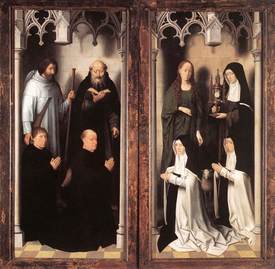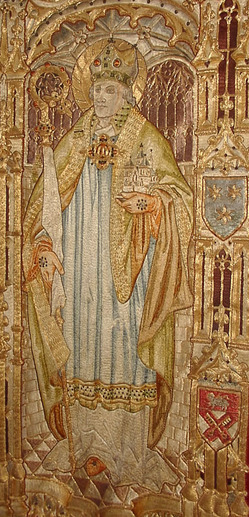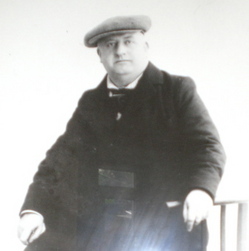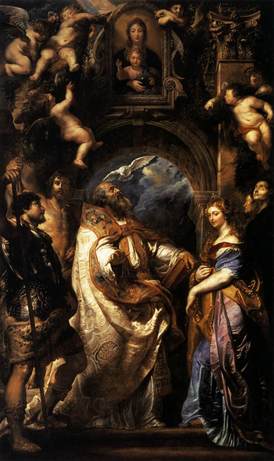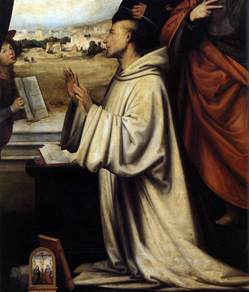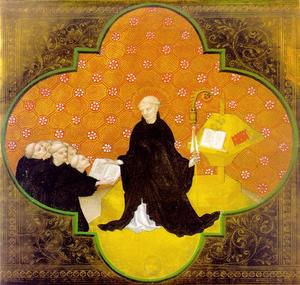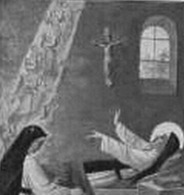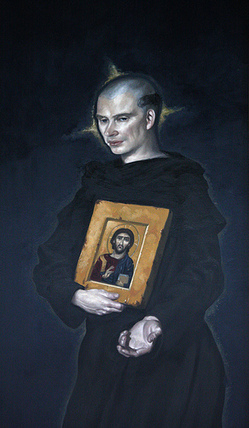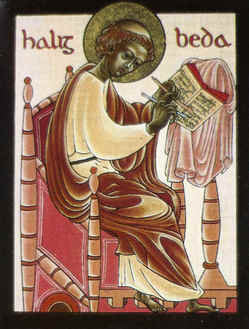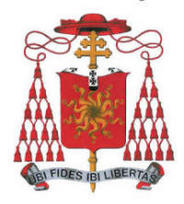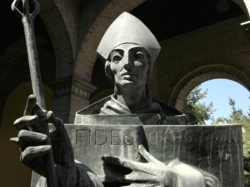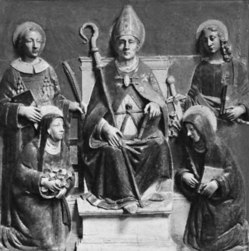We beseech Thee, O Lord, grant that the example of the holy Monks [and nuns] may stir us to a better life, so that we may imitate the actions of those whose solemnity we celebrate.
Tag: Benedictine saints and blesseds
Saint Wilfrid
The 7th century Benedictine saint, Wilfrid, who was abbot of his community, elected of bishop of York and who was a wildly talented man and influential is commemorated today. While relatively unknown in this part of the world, he is well-known in England because his tireless zeal for God’s Kingdom. He is credited for acquiring land, building monasteries and churches, patronage of secular and sacred art, and for moving the Church in England from an independent Church to one more obedient to the authority of Rome. The veneration of Wilfrid ought not to be forgotten. Today, let us pray for the Church in England, including the bishops and Benedictines there. Regarding the Benedictines, I am particularly thinking of the monks of Ampleforth, Douai, and Downside Abbeys and the nuns at Stanbrook and Tyburn.
Blessed Columba Marmion
God, our Father, you called your servant, Columba, to the
monastic life. You bestowed on him the grace to understand the mysteries of
your Son and to make him known as the ideal for all who have been baptized.
Grant that we may learn from his example to live in Christ by opening our
hearts in joy to the Spirit of your Son, our Lord, who lives and reigns with
you and the Holy Spirit, One God, for ever and ever. Amen.
The Church observes
the feast of Blessed Columba Marmion today. He was an Irishman who became a monk in Belgium,
a diocesan priest who fell in love with the Benedictine way life, its emphasis on seeking God and who served as abbot. Dom Columba died on January
30, 1923. Marmion’s liturgical memorial, however, is observed not on his anniversary
of death but on the anniversary of receiving the abbatial blessing, October 3,
1909. At that time the first Sunday of October was the Solemnity of the Most Holy Rosary
of the Blessed Virgin Mary; in this era the feast of Our Lady of the Rosary is
observed on October 7th.
Two pieces to reflect up on…
The
whole of the Christian life consists in carrying Christ to birth within us and
in having Him live there’. This, of course is nothing more than a paraphrase of St. Paul’s
injunction in Gal. 4:19: ‘until Christ is formed in you’. For Marmion this is not just our
final goal, it is our daily, essential task: to form Christ within us, through the Graces of the
sacraments and our daily encounter with God in prayer. (Mark Tierney O.S.B,
“The Life and Times of Columba Marmion”)
And
… Revelation teaches us that there is
an ineffable paternity in God. God is a Father: that is the fundamental dogma
which all the others suppose, a magnificent dogma which leaves the reason
confounded, but ravishes faith with delight and transports holy souls. God is a
Father. Eternally, long before the created light rose upon the world, God
begets a Son to whom He communicates His nature, His perfections, His beatitude
His life, to beget is to communicate [By the gift of a similar nature ] being
and life. You are My Son this day have I begotten You [Ps 2:7; Heb 1:5; 5:5],
from the womb before the day – star, I begot you [Ps 110:3]. In God, then, is
life, life communicated by the Father … Creatures can only lisp when they
speak of such mysteries… the Father, and the Son, with one same and indivisible
Divine Nature, and both, although distinct from one another [on account of
their personal properties, ‘of being Father’ and ‘of being Son’] are united in
a powerful, substantial embrace of love, whence proceeds that Third Person, Whom
Revelation calls by a mysterious name: the Holy Ghost.
Such is as far as faith
can know it, the secret of the inmost life of God; the fullness and the
fruitfulness of this life are the source of the incommensurable bliss that the
ineffable Society of the three Divine Persons possesses.
And now God – not in
order to add to His plenitude, but by it to enrich other beings – exceeds, as
it were, His Paternity. God decrees to call creatures to share this Divine
life, so transcendent that God alone has the right to live it, this eternal
life communicated by the Father to the Only Son, and by them, to the Holy
Spirit … To these mere creatures God will give the condition and sweet name
of children. By nature, God has only one Son; by love, He wills to have an innumerable
multitude: that is the grace of supernatural Adoption. (Dom Columba Marmion,
OSB, Spiritual Writings. Ed. P.
Lethiellex. Maredesous Abbey, 1998.)
A very brief note on the canonization
process of Dom Columba can be read here.
Saint Gregory the Great
The Holy Bible is like a mirror before our mind’s eye. In it we see our inner face. From the Scriptures we can learn our spiritual deformities and beauties. And there too we discover the progress we are making and how far we are from perfection. (Gregory the Great)
Saint Bernard of Clairvaux
“Take away free will, and there is nothing left to be saved. Take away grace, and there is no way of saving. Salvation can only be accomplished when both cooperate.”
Saint Benedict (and his 12 degrees of humility)
God our Father, You made Saint Benedict an outstanding guide
to teach men how to live in your service. Grant that be preferring your love to
everything else we may walk in the way of your commandments.
Famous for his work on the 12 degrees of humility, Saint Benedict proposes the following for those who want to advance in the spiritual life. The degrees of humility are given below.
The first degree of humility, then, is that a man always
have the fear of God before his eyes (cf Ps 35[36]:2), shunning all
forgetfulness and that he be ever mindful of all that God hath commanded, that
he always consider in his mind how those who despise God will burn in hell for
their sins, and that life everlasting is prepared for those who fear God. And
whilst he guard himself evermore against sin and vices of thought, word, deed,
and self-will, let him also hasten to cut off the desires of the flesh.
The second degree of humility is, when a man love not his
own will, nor is pleased to fulfill his own desires but by his deeds carried
out that word of the Lord which said: “I came not to do My own will but
the will of Him that sent Me” (Jn 6:38). It is likewise said:
“Self-will hath its punishment, but necessity win the crown.”
The third degree of humility is, that for the love of God a
man subject himself to a Superior in all obedience, imitating the Lord, of whom
the Apostle said: “He became obedient unto death” (Phil 2:8).
The fourth degree of humility is, that, if hard and
distasteful things are commanded, nay, even though injuries are inflicted, he
accept them with patience and even temper, and not grow weary or give up, but
hold out, as the Scripture said: “He that shall persevere unto the end
shall be saved” (Mt 10:22). And again: “Let thy heart take courage,
and wait thou for the Lord” (Ps 26[27]:14).
The fifth degree of humility is, when one hides from his
Abbot none of the evil thoughts which rise in his heart or the evils committed
by him in secret, but humbly confesses them. Concerning this the Scripture
exhorts us, saying: “Reveal thy way to the Lord and trust in Him” (Ps
36[37]:5). And it said further: “Confess to the Lord, for He is good, for
His mercy endures forever” (Ps 105[106]:1; Ps 117[118]:1). And the Prophet
likewise said: “I have acknowledged my sin to Thee and my injustice I have
not concealed. I said I will confess against myself my injustice to the Lord;
and Thou hast forgiven the wickedness of my sins” (Ps 31[32]:5).
The sixth degree of humility is, when a monk is content with
the meanest and worst of everything, and in all that is enjoined him holds
himself as a bad and worthless workman, saying with the Prophet: “I am
brought to nothing and I knew it not; I am become as a beast before Thee, and I
am always with Thee” (Ps 72[73]:22-23).
The seventh degree of humility is, when, not only with his
tongue he declares, but also in his inmost soul believeth, that he is the
lowest and vilest of men, humbling himself and saying with the Prophet:
“But I am a worm and no man, the reproach of men and the outcast of the
people” (Ps 21[22]:7).
The eighth degree of humility is, when a monk doeth nothing
but what is sanctioned by the common rule of the monastery and the example of
his elders.
The ninth degree of humility is, when a monk withholds his
tongue from speaking, and keeping silence doth not speak until he is asked; for
the Scripture shows that “in a multitude of words there shall not want
sin” (Prov 10:19); and that “a man full of tongue is not established
in the earth” (Ps 139[140]:12).
The tenth degree of humility is, when a monk is not easily
moved and quick for laughter, for it is written: “The fool exalts his
voice in laughter” (Sir 21:23).
The eleventh degree of humility is, that, when a monk speaks,
he speak gently and without laughter, humbly and with gravity, with few and
sensible words, and that he be not loud of voice, as it is written: “The
wise man is known by the fewness of his words.”
The twelfth degree of humility is, when a monk is not only
humble of heart, but always lets it appear also in his whole exterior to all
that see him; namely, at the Work of God, in the garden, on a journey, in the
field, or wherever he may be, sitting, walking, or standing, let him always have
his head bowed down, his eyes fixed on the ground, ever holding himself guilty
of his sins, thinking that he is already standing before the dread judgment
seat of God, and always saying to himself in his heart what the publican in the
Gospel said, with his eyes fixed on the ground: “Lord, I am a sinner and
not worthy to lift up mine eyes to heaven” (Lk 18:13); and again with the
Prophet: “I am bowed down and humbled exceedingly” (Ps 37[38]:7-9; Ps
118[119]:107)
Saint Alice of Schaerbeek
Saint Alice of Schaerbeek, a 13th century
Cistercian-Benedictine nun, was known for her intense love of Christ. Since
1702 the Cistercians have been remembering Saint Alice liturgically.
She’s the
patron saint of those living with leprosy, the blind and paralyzed.
Saint Augustine of Canterbury
O God, Who by the preaching and wondrous deeds of blessed
Augustine, Thy Confessor and Bishop, did vouchsafe to enlighten the English
nation with the light of true faith; grant that his intercession the
hearts of the erring may return to
the unity of Thy truth, and that we may be one mind in doing Thy holy will.
Saint Augustine of Canterbury (d. 604), was the first bishop
of Canterbury, sent by Pope Saint Gregory the Great to evangelize the pagan
English peoples.
Saint Augustine had been a monk of Saint Gregory’s monastery
on the Caelian Hill in Rome. In 595/596 he was sent to England first as the abbot of a group of
monks. He established himself at Canterbury, the capital of the then powerful
Kingdom of Kent, and in time baptized King Ethelbert.
Augustine is credited for laying the very foundation of the Ecclesia Anglicana because of his pastoral vision. That he was a close associate to Gregory the Great one thinks that the friendship had some role in the former’s zeal for the Kingdom. Augustine’s method of evangelizing England was not notable: he sent missionaries to all parts of England –how else would you preach the Gospel. But what was notable was his establishing Benedictine monastic life there, especially adjacent to the cathedral. So, looking at English ecclesial life you will notice the pattern of cathedrals have abbeys attached to them.
Saint Bede the Venerable
O God, Who has glorified Thy Church by the learning of
blessed Bede, Thy Confessor and Doctor; mercifully grant to Thy servants that
they may ever be enlightened by his wisdom and aided by his merits.
Catholics in America are generally unfamiliar with Saint
Bede the Venerable. The Venerable Bede as he is often called, is rightly known as the “Father of English
History” and his lasting work, History of the English Church and People,
remains the basis of modern knowledge of the early period of the Church in
England. Church has honored Bede with the titles of Confessor and Doctor of the
Church.
Saint Anselm sought to raise the mind to the contemplation of God, Pope reminds
Pope Benedict
XVI wrote to Cardinal Giacomo Biffi, retired archbishop of Bologna, on the
occasion of the ninth centenary of the death of Saint Anselm. I find this letter
to be an amazing testimony to the operative graces at work in the Church 900
years ago and today.
What is said by the Holy Father is a great reminder of what our aim ought to be
as faithful Christians, and for those called to ministry, what our
responsibilities are.
In view of the
celebrations in which you, venerable brother, will take part as my legate in
the illustrious city of Aosta in honor of the ninth centenary of the death of
St. Anselm, which took place in Canterbury on 21 April 1109, I would like to
give you a special message in which I wish recall the main features of this
great monk, theologian and pastor of souls, whose work has left a deep mark on
the history of the Church.
The anniversary
is indeed an opportunity not to be missed to renew the memory of one of the
brightest figures in the tradition of the Church and in the history of Western
European thought. The exemplary monastic experience of Anselm, his
original method of rethinking the Christian mystery, his subtle philosophical
and theological doctrine, his teaching on the inviolable value of conscience
and on freedom as the responsible adherence to truth and goodness, his
passionate work as a shepherd of souls, dedicated with all his strength to the
promotion of “freedom of the Church,” have never ceased to arouse in
the past the deepest interest, which the memory of his death is happily
reigniting and encouraging in many ways and in different places.
In this memorial
of the “Magnificent Doctor” — as St. Anselm is called — the Church
of Aosta cannot but be recognized, the Church in which he was born and which is
rightly pleased to consider Anselm as her most illustrious son. Even when he
left Aosta in the time of his youth, he continued to carry in his memory and in
his heart the bundle of memories that was never far from his thoughts in the
most important moments of life. Among those memories, a particular place was
certainly reserved for the sweet image of his mother and the majestic mountains of his
valley with their high peaks, and perennial snow, in which he saw represented,
as if in a fascinating and suggestive symbol, the sublimity of God. To
Anselm – “a child raised in the mountains,” as Admero his biographer
calls him, (Vita Sancti Anselmi,
i, 2) – God appears to be that of which you cannot think of something bigger
[the translator probably meant “greater”]: perhaps his intuition was not
unrelated to the childhood view of those inaccessible peaks. Already as a child
he thought that in order to find God it was necessary to “climb to the
summit of the mountain” (ibid.). In fact, he will realize more and more
that God remains at an inaccessible height, located beyond the horizons
which man is able to reach,
since God is beyond the thinkable. Because of this, the journey in search of
God, at least on this earth, will never end, but will always be thought and
desire, the rigorous process of the intellect and the imploring inquiry of the
heart.
The intense
desire to know and the innate propensity for clarity and logical rigor will
push Anselm towards the “scholeae” [schools] of his time. He will
therefore join the monastery of Le Bec, where his inclination for dialectic
reflection will be satisfied and above all, where his cloistered vocation will
enkindle. To dwell on the years of the monastic life of Anselm is to encounter
a faithful religious, “constantly occupied in God alone and in the
disciplines of heaven” — as his biographer writes — in order to achieve
“such a summit of divine speculation that would enable him by a path
opened by God to penetrate, and, once penetrated, to explain the most obscure
and previously unresolved questions concerning the divinity of God and our
faith and to prove with clear reasons that what he stated belonged to
sure Catholic doctrine” (Vita Sancti Anselmi, i, 7). With these words, his biographer
describes the theological method of St. Anselm, whose thought was ignited
and illuminated in prayer. It is he himself that confesses, in his famous
work, that the understanding of faith is an approach toward a vision, which we
all yearn for and which we all hope to enjoy at the end of our earthly pilgrimage,
“Quoniam inter fidem et speciem intellectum quem in hac vita capimus esse
medium intelligo: quanto aliquis ad illum proficit, tanto eum propinquare
speciei, ad quam omnes anhelamus, existimo (Cur Deus homo, Commendatio).
The saint
desired to achieve the vision of the logical relationships inherent to
the mystery, to perceive the “clarity of truth,” and thus to
grasp the evidence of the “necessary reasons,” intimately bound
to the mystery. A bold plan certainly, and it is one whose success still occupies
the reflections of the students of Anselm today. In fact, his search of the
“intellectus” [intellect] positioned between “fides”
[faith] and “species” [vision] comes out of the source of the same
faith and is sustained by confidence in reason, through which faith in a
certain way is illuminated. The intent of Anselm is clear: “to raise the mind to
contemplation of God”
(Proslogion,
Proemium). There remain, in any event, for every theological research, his
programmatic words: “I do not try, Lord, to penetrate your depth, because
I cannot, even from a distance, compare it with my intellect, but I want to
understand, at least up to a certain point, your truth, which my heart believes
and loves. I do not seek, in fact, to try to understand it in order to believe
it, but I believe in order to understand it.”[Non quaero intelligere ut
credam, sed credo ut intelligam] (Proslogion, 1).
In Anselm, prior
and abbot of Le Bec, we underline some characteristics that further define his
personal profile. What strikes us, first of all, is his charism as an expert
teacher of spiritual life,
one who knows and wisely illustrates the ways of monastic perfection. At the
same time, one is fascinated by his instructive geniality, which is expressed
in that discernment method
— which he names, the “via discretionis” (Ep. 61) — which is a
small image of his whole life, an image composed of both mercy and firmness.
The peculiar ability which he demonstrates in initiating disciples to the
experience of authentic prayer is very peculiar: in particular, his
“Orationes sive Meditationes,” eagerly requested and widely used,
which have contributed to making many people of his time “anime
oranti” [praying souls], as with his other works, have proved themselves a
valuable catalyst in making the Middle Ages a “thinking” and, we
might add, “conscientious” period. One would say that the most
authentic Anselm can be found at Le Bec, where he remained thirty three years,
and where he was much loved. Thanks to the maturity that he acquired in a
similar environment of reflection and prayer, he will be able, as well in the
midst of the subsequent trials as bishop, to declare: “I will not retain
in my heart any resentment for any one” (Ep. 321).
The nostalgia
of the monastery will
accompany him for the rest of his life. He confessed it himself when he was
constrained, to his deepest sorrow and that of his monks, to leave the
monastery to assume the Episcopal ministry to which did not feel well disposed:
“It is well known to many,” he wrote to Pope Urban II, “the
violence which was done to me, and how much I was reluctant and contrary, when
I was brought as a bishop to England and how I explained the reasons of nature,
age, weakness and ignorance, which were opposed to this office and that absolutely
detest and shun scholastic duties, which I cannot dedicate myself to at all
without endangering the salvation of my soul” (Ep. 206). He confides later
with his monks in these terms: “I have lived for 33 years a monk —
three years without responsibility, 15 as prior, and as many as abbot — in
such a way that all the good people that knew me loved me, certainly not by my
own merits but for the grace of God, and the ones that loved me most
were those that knew me most intimately and with greatest familiarity” (Ep. 156). And he added: “You
have been many to come to Le Bec … Many of you I surrounded with a love
so tender and sweet
that each one had the impression that I did not love anyone else in the same
way” (ibid.).
Appointed
Archbishop of Canterbury and beginning, in this way, his most troubled journey,
his “love of truth” (Ep. 327), his uprightness, his strict loyalty to
conscience, his “Episcopal freedom” (Ep. 206), his ” Episcopal
honesty” (Ep. 314), his tireless work for the liberation of the Church
from the temporal conditionings and from the servitude of calculations that are
incompatible with his spiritual nature will appear in their full light. His
words to King Henry remain exemplary in this respect, “I reply that in
neither baptism nor in any other ordination that I have received, did I
promised to observe the law or the custom of your father or of the Archbishop
Lanfranco, but the law of God and of all the orders received” (Ep. 319).
For Anselm, the primate of the Church of England, one principle
applies: “I
am a Christian, I am a monk, I am a Bishop: I desire to be faithful to all,
according to the debt I have with each”
(Ep. 314). In this vein he does not hesitate to say: “I prefer to be in
disagreement with men than, agreeing with them, to be in disagreement with God” (Ep. 314). Precisely for this
reason he feels ready even for the supreme sacrifice: “I am not afraid to
shed my blood, I fear no wound in my body nor the loss of any material
good” (Ep. 311).
It is
understandable that, for all these reasons, Anselm still retains a great
actuality and a strong appeal, in as much as it is fruitful to revisit and
republish his writings, and together meditate continuously on his life. For
this reason I have rejoiced that Aosta, on the occasion of the ninth centenary
of the death of the saint, has distinguished itself with a set of appropriate
and intelligent initiatives — especially with the careful edition of his works
— with the intention to make known and loved the teachings and examples of this,
its illustrious son. I entrust to you, Venerable Brother, the task of bringing
to the faithful of the ancient and beloved city of Aosta the exhortation to
remember with admiration and affection this great fellow citizen of theirs,
whose light continues to shine throughout the Church, especially where the love
for the truths of faith and the desire for their study by the light of reason
are cultivated. And, in fact, faith and reason — “fides et ratio” — are united admirably in
Anselm. I send, with these heartfelt sentiments through you, venerable
brother, to the Bishop, Monsignor Giuseppe Anfossi, the clergy, the religious
and the faithful of Aosta and to all those who take part in the celebrations in
honor of the “Magnificent Doctor,” a special apostolic blessing,
propitiatory of an abundant outpouring of heavenly favors.
